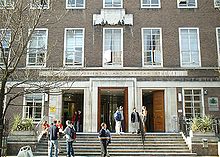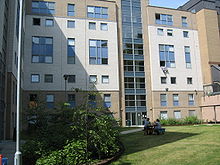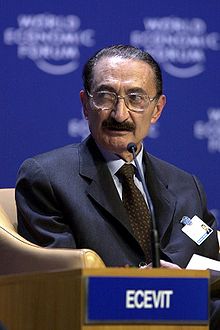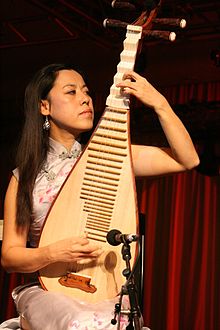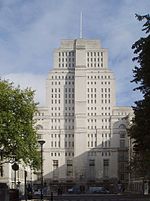- School of Oriental and African Studies
-
The School of Oriental and African Studies 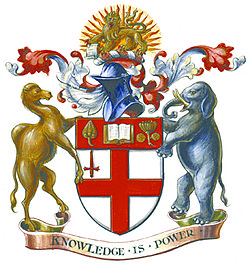
Arms of SOASMotto Knowledge is Power Established 1916 Type Public Endowment £22.6m[1] Chancellor HRH The Princess Royal (University of London) President The Baroness Kennedy of The Shaws QC Director Professor Paul Webley Pro-Director Professor Graham Furniss Students 4,525[2] Undergraduates 2,430[2] Postgraduates 2,095[2] Location London, United Kingdom Campus Urban UK University Ranking 2012 13th (Guardian) Colours Mascot Arabian Camel and Asian Elephant Affiliations University of London
ACU
1994 GroupWebsite www.soas.ac.uk 
The School of Oriental and African Studies (commonly abbreviated to "SOAS", pronounced /ˈsoʊ.æs/ soh-as or /ˈsoʊ.æz/ soh-az) is a public research university located in London, United Kingdom and a constituent college of the University of London. Specialising in laws, politics, economics (specifically development economics), humanities and languages concerning Asia, Africa and the Middle East, SOAS currently offers over 300 undergraduate Bachelor's degree combinations, and over 70 one-year intensively taught Master's degrees. MPhil and PhD degrees are also available in every academic department.
Founded in 1916, SOAS has produced several heads of state, government ministers, ambassadors, Supreme Court judges, a Nobel Peace Prize Laureate, and many other notable leaders in emerging markets, future superpowers and in the Next Eleven. Located in central London, SOAS describes itself as the "world's leading centre for the study of a highly diverse range of subjects concerned with Asia, Africa and the Middle East", and is consistently ranked amongst the top universities in the UK.[3][4]
Contents
History
The institution was founded in 1916 as the School of Oriental Studies at 2 Finsbury Circus, London, England, the then premises of the London Institution. The School received its Royal Charter on 5 June 1916; admitted its first batch of students on 18 January; and was formally inaugurated by King George V in the presence of the Earl Curzon of Kedleston among other cabinet officials just a month later on 23 February 1917. Africa was added to the school's name and remit in 1938 and the school permanently shifted to Thornhaugh Street, which runs between Malet Street and Russell Square.
For sometime in the mid-1930s, the School was located at Vandon House, Vandon Street, London SW1 (with the library located at Clarence House). However, its move was held up by delays in construction and the half-completed building—begun in June 1938—took a hit during the Blitz in September 1940. The School was, on Government's advice, evacuated to Cambridge and returned to London to resume work in July 1940. Most colleges of the University of London were evacuated from London in 1939 and billeted on universities all over the provinces. SOAS was transferred, but without its library, to Christ's College, Cambridge. When it became apparent that a return to London was possible, the School returned to the city and was temporarily housed for some months in 1940–41 in eleven rooms at Broadway Court, 8 Broadway, London SW1. From May 1942 SOAS' Japanese department became the centre for training military translators and intelligence officers.[5]
The institution's founding mission was primarily to train British administrators for overseas postings across the empire. Since then the school has grown into one of the world's most notable centres for the exclusive study of Asia, Africa and the Middle East. A college of the University of London, SOAS fields include Law, Social Sciences, Humanities and Languages with special reference to Asia and Africa. SOAS consistently ranks among the top twenty universities in the UK league tables and in 2004 was ranked 44th in the world, 7th in the UK and 11th overall in Europe according to The Times Higher Education Supplement.[citation needed] The SOAS Library, housed in Philips Building (designed at the beginning of the 1970s by Sir Denys Lasdun, and named after the then SOAS Director), is the UK's national resource for materials relating to Asia and Africa and is the largest of its kind in Europe.[6]
The School has grown considerably over the past thirty years, from fewer than 1,000 students in the 1970s to more than 4,500 students today, nearly half of them postgraduates. SOAS is partnered with the Institut national des langues et civilisations orientales (INALCO) of Paris. INALCO is often considered the French equivalent of SOAS.[citation needed]
Campuses
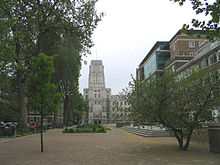 Torrington Square, with SOAS to the left, Birkbeck to the right, and Senate House in the background.
Torrington Square, with SOAS to the left, Birkbeck to the right, and Senate House in the background.
SOAS is currently split into two campuses within 20 minutes walk of each other. The Russell Square campus is located in Bloomsbury, an area at the corner of the West End known to many tourists for its shops, theatres and nightlife. The main campus was moved there in 1938, and has much expanded since then. The closest Underground station is Russell Square tube station.
The Vernon Square campus in Islington, opened in 2001, is close to King's Cross railway station and only a few hundred yards from Dinwiddy House and Paul Robeson House, exclusive to SOAS students and owned by Sanctuary Management Student Housing.
The school also houses the Brunei Gallery, built as a result of an endowment from the Sultan of Brunei Darussalam, and inaugurated by the Princess Royal, as Chancellor of the University of London, on 22 November 1995. Its facilities include exhibition space on three floors, a book shop, a lecture theatre, and conference and teaching facilities. The Gallery stages a comprehensive programme of temporary exhibitions of both historical and contemporary materials which reflect subjects and regions studied at SOAS. On 11 October 2007, the Gallery presented an exhibition drawn from the School's own collections, Objects of Instruction: Treasures of the School of Oriental and African Studies, and a rotating selection from this collection is on permanent display in the Foyle Special Collections Gallery.
The Japanese style roof garden on top of the Brunei Gallery was built during the Japan 2001 celebrations and was officially opened by the sponsor, Haruhisa Handa, an Honorary Fellow of the School, on 13 November 2001. The garden is dedicated to Forgiveness, which is the meaning of the kanji character engraved on the garden’s granite water basin. Peter Swift, a designer with experience of adapting Japanese garden design principles to the British environment and climate, conceived the garden as a place of quiet contemplation and meditation as well as a functional space complementary to the Gallery and its artistic activities.
The school also hosted the Percival David Foundation of Chinese Art, one of the foremost collections of Chinese ceramics in Europe. The collection has been loaned to and is now on permanent display in Room 95 of the British Museum. The present library building (by Sir Denys Lasdun) was added in 1973, the Brunei Gallery in 1995, and an extension to the library building opened in 2004 (the second phase of this expansion was completed in 2006).
The Centenary Masterplan conceives of the development of two new buildings, and a substantial remodelling of existing space to realign and develop the entrance and two areas within the Old Building. The cost estimates for the Centenary Masterplan settle at around £73m for the total project. The full implementation of the School's Centenary Masterplan will deliver approximately 30% additional space, approximately 1,000 sq metres.
Academics
 Outside the SOAS Faber Building, 24 Russell Square, commemorating T. S. Eliot's years at Faber and Faber.
Outside the SOAS Faber Building, 24 Russell Square, commemorating T. S. Eliot's years at Faber and Faber.
SOAS is world famous as a "leading centre for the study of a highly diverse range of subjects concerned with Asia, Africa and the Middle East."[7]
SOAS trains government officials on secondment from around the world in; Asian, African and Middle Eastern languages, especially in Arabic and Mandarin Chinese. It also acts as a consultant to several government departments and to companies such as Accenture and Deloitte – when they seek to gain specialist knowledge of the matters concerning Asia, Africa and the Middle East.[8]
Library
The world-renowned SOAS library is housed in the Philips Building on the Russell Square campus and was built in 1973. It houses more than 1.5 million items and extensive electronic resources for the study of Africa, Asia and the Middle East, and attracts scholars from all over the world.[9] The library is also one of the UK's five National Research Libraries.[10] It is currently undergoing a £12 million modernisation and enlargement programme (known as 'the Library Transformation Project') that aims to increase capacity and create new student study spaces.[11] It will transform the School as it approaches its centenary in 2016 and provide a modern environment for its staff, students and users from around the world.
The Library was designed by the celebrated architect Denys Lasdun who also designed some of Britain's most famous brutalist buildings such as the National Theatre and the Institute of Education.
Department of Linguistics
The SOAS Department of Linguistics was the first ever linguistics department in United Kingdom, founded in 1932 as a centre for research and study in Oriental and African languages.[12] J. R. Firth, known internationally for his original work in phonology and semantics, was Senior Lecturer, Reader and Professor of General Linguistics at the school between 1938 and 1956.
Rankings
Although it is debatable whether University League Tables can accurately compare the quality of small specialised research institutions such as SOAS to general universities with tens of thousands of students and departments in nearly every academic discipline, or even to other specialised institutes with completely different kinds of focuses,[13] in 2005, SOAS placed 4th among United Kingdom universities in a Guardian poll.[14] In the subject tables of this poll, SOAS was placed 3rd for Anthropology, 4th for Economics, 3rd for History and History of Art, 6th for Law, 5th for Music, 3rd for Politics, and 3rd for Theology and Religious Studies. The History Department obtained a rare 6 research rating in the last government assessment, placing it as only one of three departments in the country to achieve such a status.[citation needed]
The Times Higher Education world rankings place SOAS 44th in the world, 7th in the United Kingdom, and 11th in Europe. SOAS is also regarded for its focus on small group teaching with a student-staff ratio of only 11:1 and some departments 6:1. SOAS currently features in the world's top 50 Universities for Arts & Humanities, according to the QS World University Rankings.[15]
UK University Rankings 2012 2011 2010 2009 2008 2007 2006 2005 2004 2003 2002 2001 2000 1999 1998 Times Good University Guide 23 27th[16] 33rd[17] 24th[18] 18th[19] 18th[20] 15th 19th[21] 22nd 27th[22] 23rd= 14th 14th 6th Guardian University Guide 13th[23] 11th[24] 12th 8th[25] 11th[26] 6th 6th[27] 4th[28] 4th[28] 4th[29] Sunday Times University Guide 32nd[16] 33rd[30] 24th[31] 21st[31] 21st[32] 18th[33] 29th[33] 14th[33] 38th[33] 25th[33] 13th[33] 11th[33] Daily Telegraph 24th[34] 10th= 12th[35] FT 17th[36] 13th[35] 6th[37] 13th[38] 6th[39] Independent / Complete 18th[40] 15th[41] 15th[42] 9th[42] 24th[42] 15th[42] Management
2006–present Paul Webley is the current Director of SOAS. He was previously Senior Deputy Vice Chancellor and Professor of Economic Psychology at the University of Exeter.
2001–2006 Colin Bundy spent five years as Director and Principal of SOAS (and three years as Deputy Vice-Chancellor of the University of London). In 2006, he accepted appointment as Warden of Green College, Oxford.[43]
1996–2000 Professor Bundy's immediate predecessor was Sir Tim Lankester KCB, was Director and Principal 1996–2000 and left the School to become President of Corpus Christi College, Oxford.[44]
Halls of residence
Paul Robeson House
Paul Robeson House[45][46] is student housing for SOAS[47] on the Pentonville Road in London, England, and is owned by Shaftesbury Student Housing.[48] The address is 1 Penton Rise.[49] The nearest train and tube station is King's Cross.[50] The accommodation is used for international SOAS summer schools.[51]
Paul Robeson House together with James Lighthill House, another hall of residence for University College London, are on the site of a former steel-stockbroking depot, owned and operated by Macready's Metal Co. Ltd.[45] The original warehouse, built in 1935, was designed by M. Stanley Blanchfield of Raynes Park.
Paul Robeson the African American concert singer, after whom the building is named, made a significant impression at SOAS in the early 20th century. In the autumn of 1998, Paul Robeson House was opened by SOAS in his honour.[52]
Dinwiddy House
Dinwiddy House is another SOAS hall of residence close to Paul Robeson House primarily inhabited by undergraduate students of the university during the academic year.[53]
Notable people
Notable alumni
Main page: :Category:Alumni of the School of Oriental and African StudiesSOAS has many notable alumni in positions of authority around the world, reflecting its status and its international remit. They include:
Royalty
- Sultan Salahuddin, King of Malaysia 1999–2001
- Mette-Marit, Crown Princess of Norway
- Anthony Brooke, Rajah Muda of Sarawak
- Princess Maria Laura of Belgium, Archduchess of Austria-Este
Government and politics
- John Atta Mills, Current President of Ghana
- Luisa Diogo, Former Prime Minister of Mozambique
- Bülent Ecevit, Former Prime Minister of Turkey
- Lord Wilson of Tillyorn, 27th Governor of Hong Kong
- Sir Edward Youde, 26th Governor of Hong Kong
- Aung San Suu Kyi, Nobel Peace Prize laureate
- Idris Kutigi, Chief Justice of the Supreme Court of Nigeria
- Sylvester Umaru Onu, Judge of the Supreme Court of Nigeria
- David Lammy, Member of the British Parliament and Former Minister
- Hüseyin Çelik, Turkish Minister of Education and Member of Parliament
- Aaron Mike Oquaye, Minister of Communication in Ghana
- Amal Pepple, Minister of Housing, Lands and Urban Development in Nigeria and Former Head of the Nigerian Civil Service
- Femi Fani-Kayode, Former Minister of Culture and Tourism and Former Minister of Aviation in Nigeria
- Francis K. Butagira, Ambassador and Permanent Representative, Mission of the Republic of Uganda to the United Nations
- David Warren, UK Ambassador to Japan
- Quinton Quayle, UK Ambassador to the Kingdom of Thailand and to Lao People's Democratic Republic
- Sir Michael Weir, former UK ambassador to Egypt
- Johnnie Carson, US Assistant Secretary of State for African Affairs and Former US Ambassador to Kenya, Zimbabwe and Uganda
- Jemima Khan, UK Ambassador to UNICEF
- Kraisak Choonhavan, Former Senator in the Senate of Thailand
- Samia Nkrumah, Ghanaian Member of Parliament
- Hassan Taqizadeh, Member of Iranian Parliament and Diplomat
- Ivor Stanbrook, Member of the British Parliament and Diplomat
- Emma McCune, British foreign aid worker
- Herbert Chitepo First Black Rhodesian Barrister
- Maajid Nawaz, co-founder and Executive Director of Quilliam (think tank), the world's first counter-extremism think tank.
- Enoch Powell, British politician
- Walter Rodney, historian and Guyanese political activist
- Gita Sahgal, writer and journalist, film director, and human rights activist
- Alan Senitt, political activist for homosexual rights
- Sir John Vinelott, lawyer and judge
- Lord Jay of Ewelme, civil servant
- Michael C Williams, UN Special Coordinator for Lebanon
Media/writers
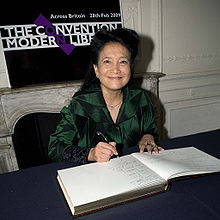 The Chinese-born British writer Jung Chang, who is best known for her family autobiography Wild Swans.
The Chinese-born British writer Jung Chang, who is best known for her family autobiography Wild Swans.
- Zeinab Badawi, newsreader
- Fatima Bhutto, author and journalist
- James Brandon, newspaper journalist
- Martin Bright, journalist, political editor of the Jewish Chronicle
- Jung Chang, writer
- Chris Crudelli, Author & BBC Television Broadcaster
- Hossein Derakhshan, Iranian blogger credited with starting the blogging revolution in Iran, now a political prisoner[54]
- Jamal Elshayyal, news producer at Al Jazeera English
- Ghida Fakhry, journalist and news anchor at Al Jazeera English
- Faris Glubb, son of Glubb Pasha, activist, author and journalist
- Aidan Hartley, author and journalist
- Dom Joly, television comedian and journalist
- Sabiha Al Khemir, Tunisian writer and expert in Islamic art
- Clive King author
- Lindsey Hilsum, Channel 4 News correspondent and columnist for the New Statesman.
- Khyentse Norbu, film-maker and Tibetan Buddhist Lama
- Taimur Rahman, Member CentComm Communist Mazdoor Kissan Party
- Andrew Robinson, author and journalist
- Saira Shah, journalist and film-maker
- Freya Stark, travel writer
- Sufiah Yusof, mathematics prodigy[55]
- Sherine Tadros, al Jazeera English correspondent
Academia
- Mario Aguilar, Oromo scholar and theologian, professor, director of the Centre for the Study of Religion and Politics (CSRP) at the University of St. Andrews.
- Ali Ansari, historian, Iran expert, professor, director of the Centre for Iranian Studies at University of St Andrews.
- Issa J. Boullata, Arabic literature & Qur'anic studies, Emeritus Professor, Institute of Islamic Studies, McGill University, Montreal, Quebec, Canada.
- Urvashi Butalia, historian, feminist, founder and director of Kali for Women
- K.N. Chaudhuri, historian, author, creative writer, and graphic artist
- George N. Clements, linguist, Senior Research Director at the CNRS, Paris, France
- Simon Digby, oriental scholar
- Diana L. Eck, Professor of Comparative Religion and Indian Studies at Harvard University
- Antony Flew, philosopher
- Wang Gungwu, Chinese historian, former Vice Chancellor of University of Hong Kong, Current Chairman of East Asian Institute (National University of Singapore)[56]
- Fred Halliday, academic, Montague Burton Professor of International Relations at the London School of Economics
- Ian Hancock, linguist and Romani scholar
- Anthony Hyman, academic, writer and Islamicist
- Robert Graham Irwin, historian and writer on Arabic literature
- Marsden Jones, Islamic scholar, Emeritus Professor and founding director of the Centre for Arabic Studies at the American University in Cairo
- Dr Samten Karmay, Tibetologist, expert on Bon religion, CNRS
- Kusuma Karunaratne, Sri Lankan academic, university administrator, Professor and scholar of Sinhalese language and literature
- Nick Knight, Professor of Asian Studies at Griffith University
- Gregory B. Lee, Professor of Chinese and Transcultural Studies. Director of the Institute for Transtextual and Transcultural Studies
- Bernard Lewis, Islamic scholar and Emeritus Professor at Princeton University, USA
- Duncan McCargo, Professor of Southeast Asian Politics at University of Leeds
- Farish Noor, academic, historian specialised in Southeast Asian region
- Martin Orwin, author, scholar, and poet
- James R. Russell, academic, Mashtots Professor of Armenian Studies at Harvard University
- Kamal Salibi, Lebanese historian and professor
- Tsering Shakya historian and Tibetologist, Professor at University of British Columbia.
- Ram Sharan Sharma historian of Ancient India; Professor Emeritus at University of Patna, founder chairperson of Indian Council of Historical Research.
- Alireza Shapour Shahbazi, prominent Persian archaeologist, Iranologist, world expert on Achaemenid archaeology
- Patrick Sookhdeo, theologian and Anglican canon
- Romila Thapar, historian, Professor Emerita of Ancient Indian History at the Jawaharlal Nehru University
- Thomas Trautmann, historian
- Konrad Tuchscherer, academic, Associate Professor of History and Director of Africana Studies at St. John's University (New York City)
- Than Tun, historian of Burma
- Giles Ji Ungpakorn, former university lecturer at Chulalongkorn University
- Ivan van Sertima, historian and anthropologist, professor of African studies at Rutgers University
- William Montgomery Watt, historian and Islamic scholar
- Timothy J. Winter, aka Abdul Hakim Murad, Islamic scholar, author and teacher
- Ehsan Yarshater, academic, Hagop Kevorkian Professor Emeritus of Iranian Studies at Columbia University, USA
- Rosemarie Said Zahlan, historian, writer on the Persian Gulf states
Music and the arts
- Khyam Allami, musician, oud player
- M. K. Asante, Jr., writer and filmmaker
- Thurston Clarke, writer
- Raman Mundair, writer, artist, poet and playwright
- Olu Oguibe, artist and academic
- Derwin Panda, musician and producer
- Paul Robeson, musician, writer and civil rights activist
- Gareth Williams, musician, member of This Heat
- Cheng Yu, musician
Business and finance
- Atiur Rahman, Governor of Bangladesh Bank, the central bank of the country.
- Sir Dermot de Trafford, banker, businessman and aristocrat
- Abdulsalam Haykal, CEO of Transtek Systems, CEO of Haykal Media, publisher of Aliqtisadi, and Forward Magazine
- Peter Parker, chairman of the British Railways Board
Religion
- Maurice Noël Léon Couve de Murville, Archbishop of Birmingham 1982–99
- Archbishop Michael Fitzgerald, President of the Pontifical Council for Interreligious Dialogue 2002–2006, Apostolic Nuncio to Egypt (from 2006)
- Andrew Bertie, Grand Master of the Sovereign Military Order of Malta, and distant relative of Queen Elizabeth II.
- David Young, Bishop of Ripon 1977–1999
Notable faculty and staff
See also: Category:Academics of the School of Oriental and African StudiesPrincipals
- Sir Cyril Philips (often credited as the creator of modern SOAS)[57]
- Sir Tim Lankester KCB, Director and Principal (1996–2000), left the School to become President of Corpus Christi College, Oxford
- Colin Bundy, Director and Principal (2001–06), left the School to become President of Green College, Oxford
- Paul Webley
Faculty of Law and Social Sciences
- Gilbert Achcar, Globalisation
- Malcolm Caldwell, Southeast Asian Economic History
- Ben Fine, Economics
- Mushtaq Khan, Economics
- Laleh Khalili, Middle East Politics
- Michael Palmer, East Asian Law
- Philip Stott, Biogeography
- Charles R. H. Tripp, Middle East Politics
Faculty of Arts and Humanities
- Nelida Fuccaro, Middle Eastern History
- Timothy Barrett, East Asian History
- Arthur Llewellyn Basham, Indian History
- K.N. Chaudhuri, Indian History
- Michael Cook, Islamic History
- Patricia Crone, Islamic History
- Lucy Duran, African Music
- Gerald Hawting, History of the Near Middle East
- Jung Chang, writer and historian, author of Wild Swans
- Nasser David Khalili, Islamic Art
- Roland Oliver, African History
- Alexander Piatigorsky, History of South Asia
- Timon Screech, Japanese art, architecture and history
- Charles R. H. Tripp, Middle East History
- John Wansbrough, Islamic History
Faculty of Languages and Cultures
- Muhammad Abdel-Haleem, Islamic Studies
- Shirin Akiner, Central Asian Studies
- David Appleyard, Languages of the Horn of Africa
- Charles Bawden, Mongolian Studies
- Mary Boyce, Iranian Studies
- John Rupert Firth, Linguistics
- Sir Hamilton Gibb, Orientalist
- Angus Charles Graham, Classical Chinese
- Alfred Guillaume, Islamic Studies
- Walter Bruno Henning, Iranian Studies
- Michel Hockx, China and Inner Asia Studies
- Reginald Johnston, Chinese language and literature
- Hugh N. Kennedy, Arabic
- Ann Lambton, Iranian Studies
- Wendy Doniger O'Flaherty, Indian religion
- Patrick Geoffrey O'Neill, Japanese
- Vladimir Minorsky, Iranian Studies
- David Marshall Lang, Caucasian Studies
- Bernard Lewis, Middle East Studies
- Tudor Parfitt Modern Jewish Studies
- Xiao Qian, China and Inner Asia Studies
- William Radice, Bengali language and literature
- Ralph Russell, Urdu language and literature
- Nicholas Sims-Williams, Iranian and Central Asian Studies
- David Snellgrove, Tibetan Studies
- Arthur Stanley Tritton, Arabic language and literature
- Paul Thompson, Classical Chinese
- Edward Ullendorff, Ethiopian Studies and Semitic Languages
- Arthur Waley, Japan & China Studies
- Richard Olaf Winstedt, Malay language and literature
References
- ^ [1][dead link]
- ^ a b c "Table 0a – All students by institution, mode of study, level of study, gender and domicile 2005/06". Higher Education Statistics Agency online statistics. http://www.hesa.ac.uk/holisdocs/pubinfo/student/institution0506.htm. Retrieved 31 March 2007.
- ^ "guardian.co.uk | Education". London: Browse.guardian.co.uk. 17 January 2008. http://browse.guardian.co.uk/education?SearchBySubject=true&Subject=University+ranking&Institution=Soas&Go=Go. Retrieved 29 April 2010.
- ^ "League Table of UK Universities 2009". The Complete University Guide. http://www.thecompleteuniversityguide.co.uk/single.htm?ipg=6524. Retrieved 29 April 2010.
- ^ Sadao Ōba The 'Japanese' war: London University's WWII secret teaching programme p.11
- ^ "About SOAS Library". Soas.ac.uk. http://www.soas.ac.uk/library/about/. Retrieved 29 April 2010.
- ^ "The School of Oriental and African Studies (SOAS) – University of London". SOAS. 21 April 2010. http://www.soas.ac.uk/. Retrieved 29 April 2010.
- ^ "Interface – Previous Client". School of Oriental and African Studies. http://www.soas.ac.uk/business/interface/clientlist/.
- ^ http://www.soas.ac.uk/library/about/
- ^ http://www.soas.ac.uk/library/about/collectionoverview/
- ^ http://www.soas.ac.uk/library/ltp/library-transformation-project.html
- ^ http://www.soas.ac.uk/linguistics/
- ^ UK University Rankings
- ^ "Institution-wide". The Guardian (London). 2005. http://browse.guardian.co.uk/education?SearchBySubject=true&FirstRow=0&SortOrderDirection=&SortOrderColumn=&Subject=Institution-wide&Institution=&Tariff=6. Retrieved 10 August 2006.
- ^ "THE – QS World University Rankings 2009 – Arts and Humanities". QS Quacquarelli Symonds Ltd.. 2009. http://www.topuniversities.com/university-rankings/world-university-rankings/2009/subject-rankings/arts-humanities. Retrieved 14 October 2009.
- ^ a b The London Student, 13 September 2010
- ^ Foster, Patrick. "The Times Good University Guide 2010". The Times (London). http://extras.timesonline.co.uk/tol_gug/gooduniversityguide.php. Retrieved 23 May 2010.
- ^ Foster, Patrick. "The Times Good University Guide 2009". The Times (London). http://extras.timesonline.co.uk/tol_gug/gooduniversityguide.php. Retrieved 23 May 2010.
- ^ Foster, Patrick. "The Times Good University Guide 2008". The Times (London). http://extras.timesonline.co.uk/gug/gooduniversityguide.php. Retrieved 23 May 2010.
- ^ Foster, Patrick. "The Times Good University Guide 2007 – Top Universities 2007 League Table". The Times (London). http://www.timesonline.co.uk/displayPopup/0,,102571,00.html. Retrieved 23 May 2010.
- ^ "The Times Top Universities". The Times (London). http://www.timesonline.co.uk/displayPopup/0,,32607,00.html. Retrieved 23 May 2010.
- ^ "Times Good University Guide 2003" (PDF). University of Nottingham. http://www.nottingham.edu.my/News/News/Documents/2002/Nottingham%20wins%20in%20popularity%20stakes.pdf.
- ^ http://www.guardian.co.uk/education/table/2011/may/17/university-league-table-2012
- ^ "University guide 2011: University league table". The Guardian (London). 8 June 2010. http://www.guardian.co.uk/education/table/2010/jun/04/university-league-table.
- ^ "University ranking by institution". The Guardian (London). http://browse.guardian.co.uk/education?SearchBySubject=true&FirstRow=&SortOrderDirection=&SortOrderColumn=&Subject=University+ranking&Institution=. Retrieved 23 May 2010.
- ^ "University ranking by institution". The Guardian (London). http://browse.guardian.co.uk/education?SearchBySubject=&FirstRow=29&SortOrderDirection=&SortOrderColumn=GuardianTeachingScore&Subject=University+ranking&Institution=. Retrieved 23 May 2010.
- ^ "University ranking by institution". The Guardian (London). http://browse.guardian.co.uk/education/2006?SearchBySubject=&FirstRow=20&SortOrderDirection=&SortOrderColumn=GuardianTeachingScore&Subject=Institution-wide&Institution=. Retrieved 23 May 2010.
- ^ a b "University ranking by institution". The Guardian (London). http://education.guardian.co.uk/universityguide2005/table/0,,-5163901,00.html?start=40&index=3&index=3. Retrieved 23 May 2010.
- ^ "University ranking by institution". The Guardian 2003 (University Guide 2004) (London). http://education.guardian.co.uk/higher/unitable/0,,-4668575,00.html. Retrieved 23 May 2010.
- ^ "The Sunday Times Good University Guide League Tables". The Sunday Times (London). http://extras.timesonline.co.uk/stug/universityguide.php. Retrieved 3 March 2009.
- ^ a b "The Sunday Times University League Table" (PDF). The Sunday Times (London). http://extras.timesonline.co.uk/stug2006/stug2006.pdf. Retrieved 23 May 2010.
- ^ Foster, Patrick. "The Sunday Times University Guide 2005". The Times (London). http://www.timesonline.co.uk/article/0,,8404-1246752,00.html. Retrieved 23 May 2010.
- ^ a b c d e f g "University ranking based on performance over 10 years" (PDF). The Times (London). 2007. http://extras.timesonline.co.uk/pdfs/univ07ten.pdf. Retrieved 28 April 2008.
- ^ "University league table". The Daily Telegraph (London). 30 July 2007. http://www.telegraph.co.uk/news/main.jhtml;jsessionid=HXFCSGXMNVABTQFIQMFCFGGAVCBQYIV0?xml=/news/2007/07/30/ncambs430.xml.
- ^ a b "The 2002 ranking – From Warwick". Warwick Uni 2002. http://www2.warwick.ac.uk/services/academicoffice/ourservices/planning/businessinformation/academicstatistics/2002/table_81.xls.
- ^ "The FT 2003 University ranking". Financial Times 2003. http://www.grb.uk.com/448.0.html?cHash=5015838e9d&tx_ttnews%5Btt_news%5D=9&tx_ttnews%5Buid%5D=9.
- ^ "FT league table 2001". FT league tables 2001. http://specials.ft.com/universities2001/FT3HLLAN6LC.html.
- ^ "FT league table 1999-2000". FT league tables 1999–2000. http://specials.ft.com/ln/ftsurveys/industry/pdf/top100table.pdf.
- ^ "FT league table 2000". FT league tables 2000. http://specials.ft.com/ln/ftsurveys/industry/scbbbe.htm.
- ^ http://www.thecompleteuniversityguide.co.uk/league-tables/rankings
- ^ http://www.thecompleteuniversityguide.co.uk/single.htm?ipg=6570
- ^ a b c d "The Independent University League Table". The Independent (London). 24 April 2008. http://www.independent.co.uk/news/education/higher/the-main-league-table-2009-813839.html. Retrieved 23 May 2010.
- ^ "Oxford Blueprint, Vol 6, Issue 11". University of Oxford. 1 June 2006. http://www.ox.ac.uk/blueprint/2005-06/0106/14.shtml. Retrieved 10 August 2006.
- ^ "About SOAS: Sir Tim Lankester KCB". School of Oriental and African Studies. Archived from the original on 30 September 2007. http://web.archive.org/web/20070930155550/http://www.soas.ac.uk/about/index.cfm?navid=2583. Retrieved 13 August 2006.
- ^ a b English Heritage (2008). Temple, Philip. ed. Northern Clerkenwell and Pentonville: Survey of London. 47. Yale University Press. p. 368. ISBN 978-0300139372.
- ^ Paul Robeson House Virtual Tour, SOAS, UK.
- ^ "Accommodation: SOAS Halls of Residence". School of Oriental and African Studies, University of London, UK. http://www.soas.ac.uk/admissions/pg/accommodation/. Retrieved 22 March 2011.
- ^ "Paul Robeson House". k/ Sanctuary Management Services, UK. http://www.smsstudent.co.uk/paulrobesonhouse.asp. Retrieved 21 March 2011. "Paul Robeson House is a postgraduate residence for SOAS students. It has 252 single en-suite rooms for single students and 7 double en-suite rooms plus one one-bedroom flat for student couples"
- ^ "Paul Robeson House (London)". Wikimapia. http://wikimapia.org/1544264/Paul-Robeson-House. Retrieved 23 March 2011.
- ^ "School of Oriental and African Studies". k/ The Student Room, UK. http://www.thestudentroom.co.uk/wiki/School_of_Oriental_and_African_Studies_%28SOAS%29. Retrieved 22 March 2011. "There are two self-catering houses solely for students at SOAS, Dinwiddy House and Paul Robeson House. They are both located on Pentonville Road"
- ^ "Accommodation". Summer School 28 – 31 July 2011, SOAS, London, UK. European Shakuhachi Society. http://www.shakuhachisummer-soas.com/accommodation.html. Retrieved 23 March 2011.
- ^ "SOAS Alumni Newsletter". 17. School of Oriental and African Studies, University of London, UK. Winter 1998. p. 15.
- ^ "Dinwiddy House". k/ Sanctuary Management Services, UK. http://www.smsstudent.co.uk/dinwiddyhouse.asp. Retrieved 30 March 2011.
- ^ Jane Perrone (18 December 2003). "Weblog heaven | Media | guardian.co.uk". The Guardian (London). http://www.guardian.co.uk/technology/2003/dec/18/weblogs. Retrieved 29 April 2010.
- ^ Tweedie, Neil (1 April 2008). "Sufiah Yusof – child genius revealed as prostitute". The Guardian (London). http://www.telegraph.co.uk/portal/main.jhtml?xml=/portal/2008/04/01/ftgenius101.xml. Retrieved 8 April 2008.
- ^ East Asian Institute: Staff: Current Staff: Chairman
- ^ Peter Robb (2 February 2006). "Obituary: Sir Cyril Philips | Education". The Guardian (London). http://www.guardian.co.uk/news/2006/feb/02/guardianobituaries.highereducation. Retrieved 29 April 2010.
External links
- School of Oriental and African Studies website
- Game, John 'The origins of SOAS as a colonial institution, training district'
- SOAS Student Union website
- SOAS graduates list
Links to related articles Bath • Birkbeck • Durham • East Anglia • Essex • Exeter • Goldsmiths College • Institute of Education • Lancaster • Leicester • Loughborough • Queen Mary • Reading • Royal Holloway • School of Oriental and African Studies • St Andrews • Surrey • Sussex • York
Universities and colleges in London Universities Birkbeck · Central School of Speech and Drama · Courtauld Institute of Art · Goldsmiths · Heythrop College · Institute of Cancer Research · Institute of Education · King's College London · London Business School · London School of Economics · London School of Hygiene & Tropical Medicine · Queen Mary · Royal Academy of Music · Royal Holloway · Royal Veterinary College · St George's · School of Oriental and African Studies · School of Pharmacy · University College London
Central Bodies: School of Advanced Study · University of London Institute in Paris · University Marine Biological Station, MillportOtherUniversity of the Arts London · Brunel University · City University London · University of East London · University of Greenwich · Kingston University · Imperial College London · London Metropolitan University · London South Bank University · Middlesex University · Roehampton University · Royal College of Art · University of Westminster · University of West LondonUniversity colleges BPP University College of Professional Studies · St. Mary'sOther university level colleges Further Education colleges Barking & Dagenham · Barnet · Bexley · Bromley · Capel Manor · Carshalton · City & Islington · City Lit · City of Westminster · Croydon · Ealing, Hammersmith & West London · Greenwich · Hackney · Haringey, Enfield & North East London · Harrow · Havering · Hillcroft · Kensington & Chelsea · Kingston · Lambeth · Lewisham · Marine Society · Mary Ward · Morley · Newham · North West London · Orpington · Redbridge · Richmond Adult · Richmond upon Thames · South Thames · Southgate · Southwark · Stanmore · Tower Hamlets · Uxbridge · Waltham Forest · West Thames · Westminster Kingsway · Working Men'sSixth form colleges BSix · Christ the King · Crossways · Coulsdon · Havering · John Ruskin · Lansdowne College · La Swap · Leyton · Newham · St Charles · St Dominic's · St Francis Xavier · Sir George Monoux · Woodhouse · Valentines · Seven Kings Universities in the United Kingdom
Universities in the United KingdomEngland LondonBirkbeck · CSSD · Courtauld · Goldsmiths · Heythrop · ICR · IoE · King's · LBS · LSE · LSHTM · Queen Mary · Royal Academy of Music · Royal Holloway · RVC · St George's · SOAS · School of Pharmacy · UCLOtherBrunel · City · East London · Greenwich · Kingston · Imperial · London Met · London South Bank · Middlesex · RCA · Roehampton · UAL · Westminster · West LondonMidlandsAston · Birmingham · Birmingham City · Coventry · De Montfort · Derby · Keele · Leicester · Lincoln · Loughborough · Northampton · Nottingham · Nottingham Trent · Staffordshire · Warwick · Wolverhampton · WorcesterNorthBolton · Bradford · Central Lancashire · Chester · Cumbria · Durham · Edge Hill · Huddersfield · Hull · Lancaster · Leeds · Leeds Metropolitan · Liverpool · Liverpool Hope · Liverpool John Moores · Manchester · Manchester Metropolitan · Newcastle · Northumbria · Salford · Sheffield · Sheffield Hallam · Sunderland · Teesside · York · York St. JohnSouthAnglia Ruskin · Bath · Bath Spa · Bedfordshire · Bournemouth · Brighton · Bristol · Buckingham · Buckinghamshire New · Cambridge · Canterbury Christ Church · Chichester · Cranfield · Creative Arts · East Anglia · Essex · Exeter · Gloucestershire · Hertfordshire · Kent · Oxford · Oxford Brookes · Plymouth · Portsmouth · Reading · Southampton · Southampton Solent · Surrey · Sussex · UWE · WinchesterNorthern Ireland Scotland Aberdeen · Abertay Dundee · Dundee · Edinburgh · Edinburgh Napier · Glasgow · Glasgow Caledonian · Heriot-Watt · Highlands and Islands · Queen Margaret · Robert Gordon · RCS · St Andrews · Stirling · Strathclyde · UWSWales Aberystwyth · Bangor · Cardiff · Cardiff Metropolitan · Glamorgan · Glyndŵr · Newport · Swansea · Swansea Metropolitan · Trinity Saint DavidNon−geographic University colleges Birmingham · Bishop Grosseteste Lincoln · Bournemouth · BPP · Falmouth · Harper Adams · Leeds Trinity · NCH · Newman · Norwich · Plymouth St Mark & St John · St. Mary's (Belfast) · St. Mary's (Twickenham) · Stranmillis · SuffolkUniversity centres Related Categories:- School of Oriental and African Studies
- Central Asian studies
- Educational institutions established in 1916
- 1994 Group
- Association of Commonwealth Universities
- Charles Holden buildings
- 1916 establishments in England
Wikimedia Foundation. 2010.

